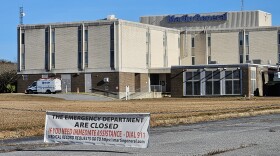The memory of a patient who visited Prospect Hill Community Health Center in 2015 for a medical appointment has stayed with family medicine doctor Evan Ashkin all these years.
He was a Black man, in his mid-30s, who’d been brought to see Ashkin by a concerned aunt. The patient had been incarcerated for several years, and the visit was his first connection to health care since his release — two years earlier.
He was uninsured and hadn’t been connected with health services upon his release — a common predicament for the more than 22,000 individuals released from North Carolina’s prisons and jails every year.
Ashkin learned the patient had cognitive issues, diabetes, high blood pressure and kidney disease. Upon further examination, Ashkin discovered he had a diabetic foot infection that eventually resulted in amputation.
The man’s health issues required expensive medical interventions such as dialysis and a number of surgeries. Ashkin estimated that his medical bills in just the first year after getting connected to care easily topped $250,000.
The kicker, Ashkin said, is that his health complications were likely preventable if he had been connected to care upon release.
“His life could have been very, very different,” Ashkin said.
That’s the case for many individuals leaving incarceration who are uninsured and struggle to get access to and afford care.
Ultimately, Ashkin’s patient got insured, qualifying for Medicaid after he was deemed disabled. But the medical coverage came too late; his life had already drastically changed from lack of treatment.
“The only way to get on Medicaid if you're a male or a non-pregnant female is to become disabled,” Ashkin said. "That's just not what we want for people, right?”
One change that could significantly improve access to health care for justice-involved individuals is Medicaid expansion. The expansion could also take pressure off jails and prisons — which become a revolving door for a substantial number of people who have mental health, substance use and chronic health issues.
Medicaid expansion — a topic under serious consideration by state legislators — would provide health coverage to more than half a million low-income North Carolinians, including thousands of individuals currently cycling in and out of the state’s prisons and jails. Advocates hope that the House and Senate will agree on a plan this legislative session, though the two chambers reached a stalemate last year. The House introduced its new bill last week, and the Senate has yet to take action.
“There's so much insecurity and worry about medical debt and bankruptcy, that people delay care or don't get care,” Ashkin said. “If patients coming out had Medicaid and were able to get seen, it would remove one of the really awful barriers that they suffer from.”
Need for expansion
Prisons and jails are constitutionally mandated to provide health care to individuals who are incarcerated. But that care often ends upon people’s release.
Because Medicaid has not been expanded in North Carolina, most people reentering society after incarceration are either uninsured or uninsurable. That complicates care and creates a roadblock to successful reentry into society, Ashkin said.

North Carolina is one of 11 states that has not chosen Medicaid expansion since the policy was made available as a result of the Affordable Care Act in late 2012. Under the Affordable Care Act, states have the option to expand Medicaid eligibility to nonelderly people with incomes up to 138 percent of the federal poverty level. Adopting expansion in North Carolina would provide health coverage to more than half a million low-income North Carolinians, including thousands of justice-involved individuals currently cycling in and out of the state’s prisons and jails.
Insufficient health care access is especially problematic for justice-involved people who have high rates of chronic diseases, mental health problems and substance use disorders. During the first two weeks after a person is released from prison, researchers found, their mortality risk is more than 12 times higher than that of the general population. That death rate skyrockets when it comes to drug overdose and illness, with research from UNC Chapel Hill finding that the newly decarcerated are at 40 times the risk of the general population for overdose death.
Research also reveals that recent criminal justice involvement is associated with increased hospital and emergency room utilization and costs.
“Timely access to health services reduces costs,” Ashkin said. “By not providing access, people have complications and very expensive hospital stays that could be avoided.”
Kristi Riley, case manager at the Durham Local Reentry Council, meets with people soon after they are released from prison or jail. She said that almost every person the Local Reentry Council serves is in need of medical care. Clients frequently tell her they need medications, eye exams, HIV checks and more.
Riley said one of her uninsured clients needs back surgery but can’t pay for the procedure. He also can’t find work because of his limited mobility and use of a walker. She said he’s waiting on disability so he can be covered by Medicaid, but that’s not a quick or easy process.
That leaves Riley’s client in a difficult situation. Too unhealthy to work, he still needs to find a way to pay for his rent and food — let alone the surgery.
“There's too many barriers in front of them to why they can't succeed once they get out: identification, housing, medical care. A lot of them, especially here in Durham, have some type of substance abuse problem,” Riley said. “They're back in the streets. They have nothing, and so they fall back into their old habits.”
But investment in health care with the expansion of Medicaid, she said, would be significant in helping to set people up for greater success reentering the community and would decrease recidivism.
Sheriffs see the benefit
That’s a sentiment shared by the North Carolina Sheriffs’ Association, which backed Medicaid expansion for the first time last year — arguing in a letter to state legislative leaders that expanding insurance coverage would likely reduce crime and enhance public safety.
Eddie Caldwell, executive vice president and general counsel of the North Carolina Sheriffs’ Association, said jails and prisons house a substantial number of people with mental health problems and substance use disorders who would be better served by a medical facility.
“But because they don't have adequate health insurance, they don't go see the doctor. They have medical problems, and that just brings those problems into the jail, which is a bigger expense for the county to have to deal with — both on having to deal with the medical issues and having to house them,” Caldwell said.
Alamance County Sheriff Terry Johnson told advocates and reporters in January 2020 that he ran the county's largest mental health facility in his jail as he made the case for Medicaid expansion. "We can pay now or we can pay later," he said about the policy. "And we are paying later with human life and people's lives being destroyed."

During his 20 years in office, Alamance County Sheriff Terry Johnson said he’s seen more and more people come in with substance use disorders and mental health problems.
“It’s a revolving door any way you look at it,” he said.
That has saddled the county with higher inmate medical costs over the years, burdening taxpayers, added Johnson, who was one of the state’s first high-profile Republicans to call for expanding Medicaid.
Recent research shows states with Medicaid expansion reported fewer violent crime and drug arrests within the first three years of enactment.
Additionally, research shows people with serious mental illness who are enrolled in Medicaid are more likely to use community health services and are less likely to wind up back in jail than those without health insurance. This emphasizes the important connection to health care that aids a successful transition from incarceration to society.
“The thought is that a healthier population will be less likely to get involved in trouble,” Caldwell said. “If they're getting mental health treatment, or if they're seeing their doctor, and they're healthy — it should reduce the number of folks coming into jail and should reduce the severity of health problems for those in the jail.”
New access to care
Ashkin’s 2015 patient encounter opened his eyes to the post-incarceration gaps in medical coverage and care — gaps that he continually sees the ramifications of.
He sees people unable to afford insulin. He sees people who can’t proceed with cancer treatments.
Ashkin’s been on a mission to help close those gaps, launching the North Carolina Formerly Incarcerated Transition (NC FIT) Program in 2017 to connect people with chronic illnesses returning from jail or prison to health care. But its resources are limited geographically to six counties and in the types of services that can be provided.
NC FIT provides a “drop in the bucket” of what’s needed, Ashkin said. Since 2018, the program has enrolled about 800 people.
He said Medicaid expansion would be “life-changing” for the justice-involved patients he serves.
Right now, NC FIT works almost exclusively with federally qualified health centers and can only help patients with primary care services.
However, Medicaid coverage would allow people to access primary care and specialty care services throughout the state, he said. It would also open up new providers and the state’s network of community health centers that accept Medicaid to serve these patients.
Johnson sees Medicaid expansion as an avenue to closing the health care access gap. The bottom line, he said, is “every American should be able to receive competent medical care if they have a sickness of any kind.”
This article first appeared on North Carolina Health News and is republished here under a Creative Commons license.






